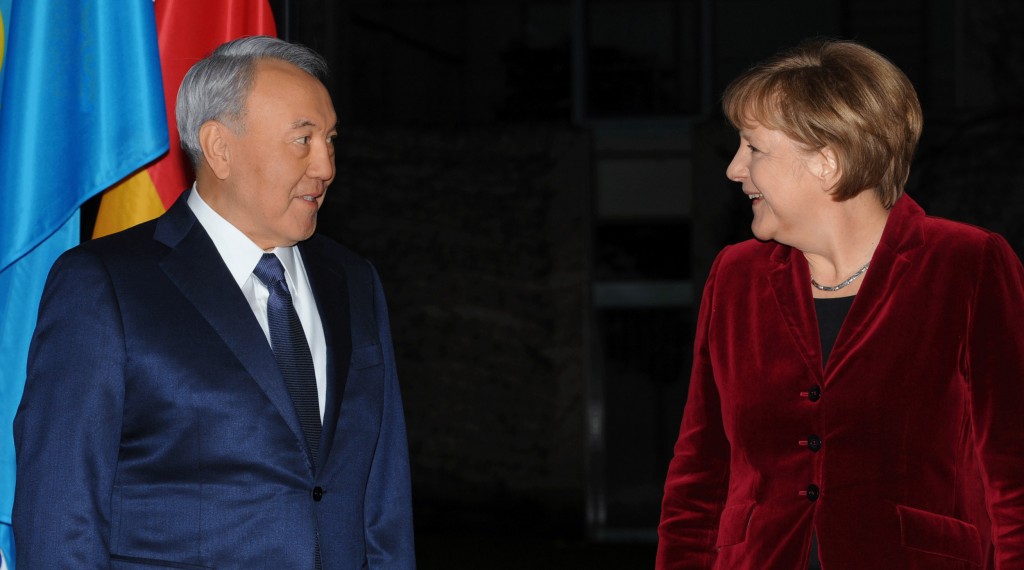ASTANA – Amid the ongoing pressure and sanctions between the West, Russia and Ukraine, President Nursultan Nazarbayev of Kazakhstan said recently that he holds out hope for a chance to reconcile the opposing parties, bringing them to the negotiating table to agree on a common stance.
 “Both Ukraine and Russia are equally close to Kazakhstan and that is why I am ready to continue talking to leaders in both Kyiv and Moscow, as well as in European capitals, in a bid to promote progress in negotiations over lasting peace in eastern Ukraine,” President Nazarbayev maintained during his annual end-of-year news briefing last December.
“Both Ukraine and Russia are equally close to Kazakhstan and that is why I am ready to continue talking to leaders in both Kyiv and Moscow, as well as in European capitals, in a bid to promote progress in negotiations over lasting peace in eastern Ukraine,” President Nazarbayev maintained during his annual end-of-year news briefing last December.
Despite mounting tensions, some of the opponents seem to brighten up on hearing there still exists a push for peace in the midst of widespread pessimism and impasse over the lingering crisis.
Ukrainian President Petro Poroshenko was first to announce on Dec. 29 that a meeting in the so-called Normandy Format will be held in the Kazakh capital Astana on Jan. 15. Moscow, for its part, confirmed Jan. 15 as a possible date for the meeting on Ukraine.
The announcement of that date, since then negotiated extensively but with no confirmation from the four participating parties, was preceded by two successive visits of President Nazarbayev to Kyiv and Moscow, during which the Kazakh leader discussed with his counterparts ways of overcoming the Ukrainian crisis.
After the meetings, Nazarbayev again discussed the issue in his telephone conversations with President Poroshenko, President of France Francois Hollande and Chancellor of Germany Angela Merkel.
As a result of lengthy negotiations, it was agreed to appoint a preliminary date for the Normandy Format meeting, which was immediately made public by the Ukrainian leader.
On Dec. 30, President Nazarbayev confirmed his willingness to host the next round of meetings between leaders of the Normandy Four in Astana, in mid-January “or at any other convenient time for the parties.”
However, numerous inter-parties negotiations have challenged further steps, calling into question the agreed meeting date.
In the meantime, another important step in a string of peacemaking efforts was made after senior diplomats from Germany, France, Ukraine and Russia met at the Federal Foreign Office in Berlin on Jan. 5 to discuss the possible resolution of the crisis. It was announced after this meeting that senior diplomats would continue their talks, as there were still some serious unresolved issues.
As a follow up to the earlier progress, Nazarbayev had an informal encounter with Chancellor Merkel in Berlin on Jan. 9. During the talks, the parties discussed bilateral cooperation as well as the situation in Ukraine, the Akorda press service reported. At the request of the German side, the Kazakh President also received German Federal Minister for Foreign Affairs Frank-Walter Steinmeier.
Later in the day, Nazarbayev had a telephone conversation with Russian President Vladimir Putin, during which the parties again discussed the progress on Ukraine, stressing the importance of joint efforts by all stakeholders for a peaceful settlement of the crisis.
On Jan. 12, the ministers of Ukraine, Russia, Germany and France gathered in Berlin, where, among other things, they discussed the possibility of the meeting of the heads of state in Kazakhstan’s Astana.
Despite the uncertainty of a Normandy Format meeting in Astana, Kazakhstan is continuing its efforts to help stabilise the situation in Ukraine. “The fratricidal war has brought true devastation to eastern Ukraine, and it is a common task to stop the war there, strengthen Ukraine’s independence and secure the territorial integrity of Ukraine,” said President Nazarbayev recently.
As part of its humanitarian assistance to Ukraine, Kazakhstan has sent $400,000 worth of aid to Ukraine’s southeastern regions to help ease the crisis following months of military conflict.
Railway cars carrying canned meat, sugar, buckwheat and vegetable oil were delivered on Jan. 9 to Severodonestsk, a town near the Ukrainian-Russian border.
Ukraine’s State Service of Emergency Situations and the administration of the Luhansk Oblast received the aid in the presence of Kazakh officials and local and international nongovernmental organisations, including the International Committee of the Red Cross and the Office of the United Nations High Commissioner for Refugees.
“Ukraine is experiencing a difficult time … and in this situation, Kazakhstan cannot stay indifferent,” a senior official from the Kazakh Embassy in Ukraine said, explaining the motive for Astana’s decision to send aid.
Deputy Head of the Luhansk Oblast State Administration Olga Lishik expressed Ukraine’s gratitude to the people of Kazakhstan for their assistance.
“This is serious support for us, including the Donetsk and Luhansk Oblasts, where military action is taking place and the civil population suffers. We are grateful that President Nazarbayev initiated the aid,” she said.
The aid shipment included 127,875 cans of meat, 40 tons of sugar, 150 tons of buckwheat and 36,000 liters of vegetable oil, among other essential items.
In addition, in October 2014, Kazakhstan donated $30,000 to the International Committee of the Red Cross’s humanitarian effort in Ukraine.
While the final decision on the Normandy Four meeting will soon be clarified, Astana holds true to its aspiration to reconcile the two brotherly nations and is determined to continue contributing its best efforts to bring lasting peace and stability to Ukraine.


